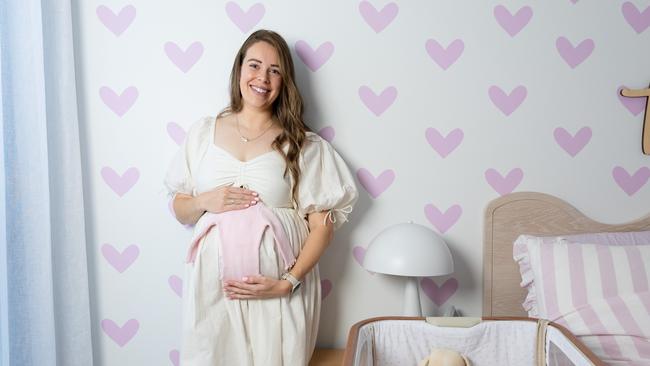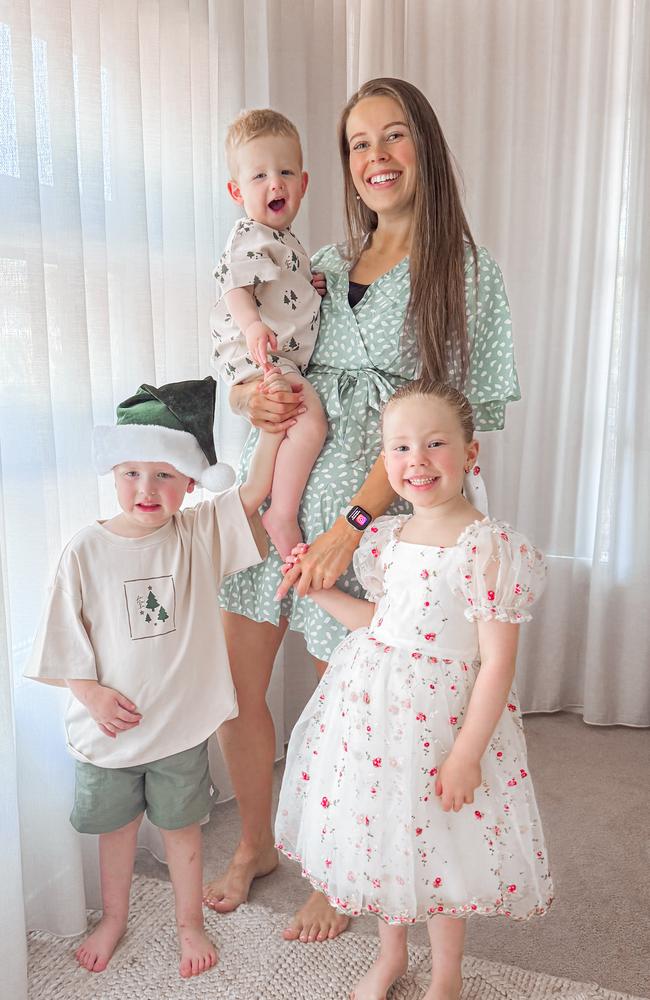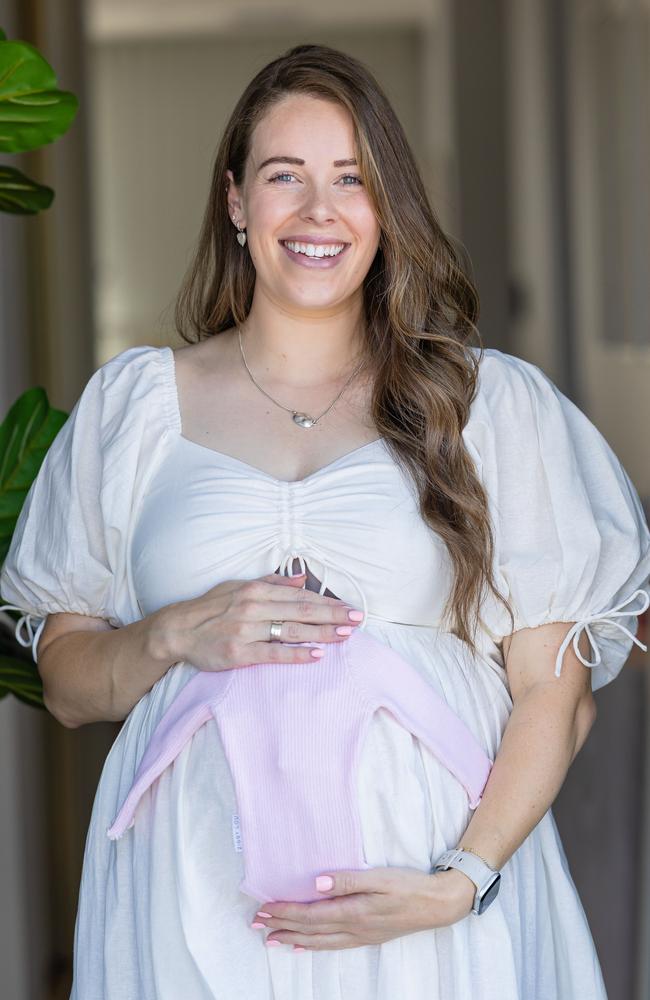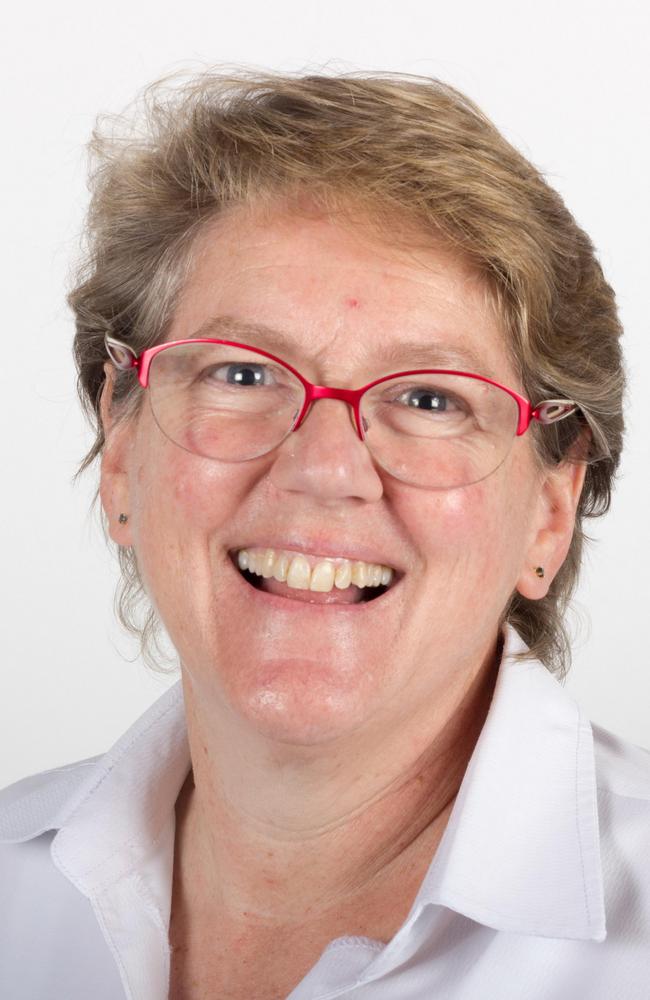Influencer Caitlin Bailey among Aussies using US for IVF sex selection
Caitlin already has two sons and a daughter. But to balance her family, she joined the thousands of Australians that have flocked to the US for IVF sex selection.

Parenting
Don't miss out on the headlines from Parenting. Followed categories will be added to My News.
Selecting your baby’s gender should be allowed in Australia according to a US doctor who said it was “absolutely ridiculous” the option wasn’t available here.
It comes as hundreds of Australian parents head overseas each year to undergo the controversial practice.
Gender selection is banned in Australia on ethical grounds. But a peak fertility group says it could be time to revisit the issue amid a declining birthrate.
California-based doctor Daniel Potter estimates his sex selection services have led to the birth of thousands of Aussie babies over more than 20 years.
Dr Potter, who will visit Brisbane, Sydney and Melbourne for seminars and consultations next month, said it was “absolutely ridiculous” Australian parents did not have the option in their homeland, noting IVF was initially controversial but now widely accepted.
Caitlin Bailey is already a single mum to two boys and a girl, conceived naturally, aged between one and five.
But the Melbourne content creator had always wanted two of each gender and spent about $45,000, including travel costs, on the process to conceive her baby girl, due in August.

“Everybody gets a brother, everybody gets a sister,” she explained.
“I really love that they’re close in age.”
The 31-year-old said she was not interested in going on dating apps,and there were “so many variables” involved if she waited for a potential partner.
Ms Bailey had “loosely” heard of sex selection prior to pursuing it.
She came across Gender Selection Australia, which partners with Dr Potter.
Ms Bailey underwent testing in Melbourne and selected a US sperm donor – a process she described as like “online shopping”.
“It took me so long to find a donor that fit everything I was looking for,” she said.
Ms Bailey, who has more than 60,000 Instagram followers, took two trips to the US – one to have eggs retrieved and the next to be implanted with the embryo – last year.

A spokeswoman from the Fertility Society of Australia and New Zealand said as part of an extensive review of the National Health and Medical Research Council (NHMRC) ethical guidelines on assisted reproductive technology, national consultation on non-medical sex selection (NMSS) was held about 10 years ago.
“Notably … a majority of submissions supported the option of NMSS,” she said.
“In 2017, at the conclusion of this review, NHMRC upheld its moratorium.
“The consultation on NMSS happened a decade ago, and amid a falling Australian birthrate and an evolving ethical landscape, it may be time to revisit the discussion.”
Melbourne IVF medical director Dr Raelia Lew said she had patients that had conceived naturally and terminated a pregnancy based on the sex of the baby because they wanted a “balanced” family.
“I’m sure many doctors have had this scenario, and it’s a very upsetting scenario,” she said.
“I personally feel that if a family felt so strongly about sex selection that they were willing to terminate a pregnancy in the first trimester based on that, it would actually be less harmful to that family to allow them to do an IVF cycle with sex selection.”
Sex selection took place through biposying embryos, which also checked for any chromosomal abnormalities, Dr Potter said.
The selection service was about an additional USD$5500 to regular IVF, he said.
Dr Pottersaid on his first visit to Australia people had been “hostile” to sex selection, but by his next trip in the mid 2010s the “tables had turned”.
But he said to a portion of Australia’s medical community, sex selection remained “morally reprehensible ”.
Dr Potter said 70 per cent of his Australian patients sought daughters.
Gender Selection Australia general manager Nikki Mason said the organisation typically saw couples with “excellent fertility” who already had two to three children of the one sex.
Some clients had money set aside to pay, while others took out loans or may ask for help from their families, she said.
The organisation says hundreds of Australian families are going overseas annually to choose the sex of their baby via IVF.
Human rights expert Paula Gerber, from Monash University’s Law Faculty, said NMSS had been banned in Australia since 2004, and this was necessary to ensure against sex imbalances and to prevent the reinforcement of sexist and discriminatory stereotypes that flowed from preferences for sons.
Professor Gerber said allowing sex selection could have profound long-term societal effects, especially when driven by cultural preferences for one sex over another.
“Legitimising sex selection is contrary to our societal values around diversity, equality and the intrinsic worth of every individual,” she said.

“Other ethical concerns relate to the commodification of children; treating them as products tailored to parental preference, rather than as individuals who are unconditionally loved and accepted for who they are.”
In Australia, sex selection is permitted to avoid risk of serious genetic conditions.
In a statement, the NHMRC said the Australian Health Ethics Committee (AHEC) again considered NMSS in 2020.
“AHEC noted the extensive discussion and consultation that informed the development of guidelines on this issue and concluded that there was no new information or perspectives that would justify reopening this issue,” the council said.
“AHEC holds the position that sex selection techniques cannot be used for non-medical purposes until there has been wider public debate and/or the states and territories legislate to allow the practice.
“Whilst NHMRC plays a national leadership role in establishing ethical guidelines … clinical practice is regulated by state and territory governments.”
If a state or territory were to enact legislation that addressed NMSS then that would take precedence, the council said.
It’s understood the federal government has no plans to instigate a review of the NHMRC guidelines.
A number of other countries, includingMexico and Thailand, allow NMSS.
Ms Bailey acknowledges sex selection is “controversial”.
“If we’ve got (technology) that allows us to do this and it’s not hurting anybody, I don’t understand why it’s not an option (in Australia),” Ms Bailey said.
While she had received some negative feedback from “nasty online trolls”, she had also been contacted by people who thanked her for speaking out and had not told their own loved ones they’d gone through the process.
“They’ve fabricated stories of why they’re going overseas … because they’re afraid of everybody’s judgment,” she said.





